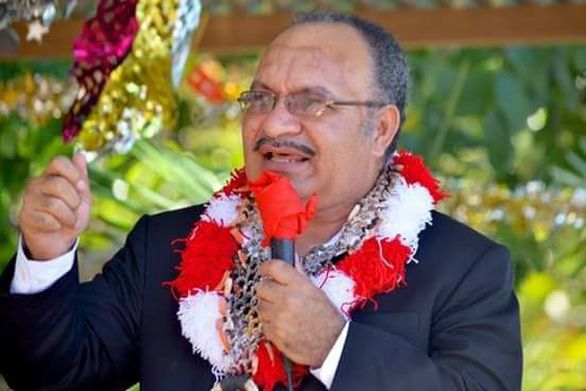Rebut on PM O'Neill's Statement to the PNG Business Council Breakfast
Commentary by Lance Lotte
The address by the Prime Minister to the PNG Business Council Back to Business Breakfast cannot go unchallenged. Challenging certain issues the Prime Minister raised is not knocking the country or being unpatriotic. We just need to be careful not to delude ourselves into believing that all is well or convince ourselves into a false sense of comfortability.
"Back to Business" should not mean back to conducting business the way we have been accustomed to the last few years. It should be about identifying mistakes and correcting them.
The Prime Minister's statement was beautifully written and cleverly pitched. But their lies the problem - it is but a public relations exercise. It is the product of adroit spin doctors that appear to have gained ascendancy at the Executive Branch of Government. Any serious follower of the state of the Papua New Guinea economy and discerning observer of the performance of the Government with respect to Budget implementation would know that what was said, many of which are regurgitations of ideas and intentions covered in previous speeches made by the Government, differs from reality.
The economy is not in good shape and is on life support. Businesses admit this. Kina Bank says businesses are doing it tough and we are seeing signs of stress. Budget implementation has been poor with annual budget appropriations representing nothing more than mirages. Expenditures are driven more by populist policies and political quid pro quo tradeoffs rather than dictated by the need for exercise of fiducial responsibility and prudent management of limited public funds.
For how long will the Government conveniently blame the low world commodity prices for the continuing lethargic performance of our economy before we do something about it? And yes, we can mitigate the global low commodity prices on our economy by seriously diversifying it and in doing so broaden the country's tax base. This Government acknowledges this. But, again, this same Government has echoed this intention to diversify the economy and to focus attention on such sectors as agriculture and tourism in numerous speeches at business conferences, Leaders' Summits, political gatherings, project ribbon-cutting events, etc, and seven years later they are still promising to do it. What is said and what is done never seem to match.
Increased budget appropriations the last few years for sectors that will broaden our economic base have not manifested themselves in any real way in those sectors. This is partly due to the inertia of the public service, but a large part is owed to systematic and systemic corruption in our government system that has eroded the checks and balances of our financial disbursement processes, allowed for changing of goal posts after the Budget is handed down resulting in unplanned expenditures, and wanton abuse of authority to transfer funds from one vote to another.
The Prime Minister has called for the Super Funds here to follow the example of their counterparts in Fiji and invest in the tourism sector. Super Funds may just consider investing in this sector if only the Government fully paid up what it owes them in members contributions.
On the Foreign Exchange issue, the Prime Minister's statement touts the World Bank and ADB possible financial assistance to assist with our FOREX woes as a done deal. The proposed US$300 million is still under discussion and the announcement is mischievous and pre-emptive, not to mention disrespectful of the due processes of the two international financial institutions.
In an attempt to portray that Government is serious in taking measures to ease the FOREX issue, the Prime Minister's statement indicates it wants companies that park monies abroad to bring those funds onshore. The issue with this is that these companies need to keep some funds overseas to meet their import requirements and loan repayment obligations. It is hoped that whatever the Government is foreshadowing does not unduly penalise businesses for simply applying prudent measures to meet their obligations. The hypocrisy of this is that Government also keeps monies outside the country to meet its obligations.
A proposal worth considering to alleviate the FOREX shortfalls is for the Government to better utilise the revenue from our gas sales. Three shipments are made each week at a cost of around US$45 million per shipment. That is almost US$135 per week and US$540 per month in revenue. It is understood that 20% of the revenue from these sales are for the people of Papua New Guinea. Where are these monies parked and what are they being used for currently? If these are being parked abroad, as some Waigani sources admit, then they should be brought back to Papua New Guinea.
To shore up the economy and bolster the Government's financial resources, the Prime Minister's statement indicated that the Government was looking at re-launching the issuance of Government Bond. He acknowledges that attempts to issue Government Bond a few years back did not materialise. It did not materialise then not because "the market was not at the right place", it was more to do with the lack of confidence that the market had in our economy and mistrust in the Government's lack of discipline in its expenditure. Have we done enough since then? Can we afford to issue the Bond now? It remains to be seen if the Government can get it over the confidence threshold now.
.
On taxation matters, a main contention in the statement is that the Tax Credit Scheme will need to be put on hold due to lack of transparency in the process. Ironically, it is the Government that approves the use of the Tax Credit Scheme. Interesting though is that businesses appear to consider this scheme good. The Country Manager of the New Britain Palm Oil echoes this feeling when he said that the scheme was transparent, practical and its results immediate.
On APEC, the Prime Minister was ill-advised to make certain assertions that were not true. Other comments did not represent the full picture and glossed over the challenges.
The claim that over 10,000 business executives and government leaders will be attending and that they will be spending over K200 million into our economy is an over exaggeration meant basically to support the Government's justifications for the huge sums of money being spent on hosting APEC.
APEC has a membership of 21 economies. We can therefore expect 20 APEC Leaders to come. Even assuming all 20 of these economies came with an average of 100 per delegation you still won't reach the 10,000 figure floated. ABAC consists of three representatives per member economy, and that would give you only 60 persons from the other twenty economies. The planned CEO Summit might attract another 100 to 200 individuals, so one wonders how the Prime Minister was advised to announce a figure of 10,000. The maths are simple, and you will never get over K200 million to be spent here even if you use the most generous of scenarios.
The Prime Minister stated categorically that "everyone is paying their own way" for APEC. The truth is that some are not. APEC protocol requires that the host Government will bear the costs of APEC Leaders, their spouses, and the different Ministers that will be attending. Our own Government's protocol practice will see us meeting the cost of all the Pacific Leaders that we will be inviting for the APEC. It is a case of public relations getting in the way of telling the truth to our people.
It was emphasised in the statement that investments made on buildings and other infrastructure for APEC will benefit the country in years to come. What is downplayed though is that these facilities will need to be managed and maintained. Our record in this regard is not one that provides comfort. We are good at building new things but so are we at neglecting them to ruins.
Rhetoric cannot replace substance, and real substance was arguably absent in the statement at the Business Council breakfast.
Absent was how to combat corruption which is debilitating our Government's ability to serve our people properly and skewing government contracts to the private sector in favour of only a few business houses. Absent was honesty about how to diversify and broaden the economic base. Absent was the whereabouts and details of usage of the revenue from the US$45 million per shipment of gas. Absent was concrete steps to clean up the rampant abuse of PSIP, DSIP and other constitutional grants, and hold to account members of Parliament that have squandered peoples' money on political projects and personal enrichment. The Head of the Department of Implementation and Rural Development have noted the embezzlement of these funds for politicians self interest. Absent was truth on APEC expenditure. Absent was specific measures to reform the public service, and absence was how exactly does the Government intend to improve the electoral process.
The statement was well crafted and, as usual, delivered by the Prime Minister with political finesse. But the emphasis in public relations over truth undermines the credibility of what was said. Political posturing must never be allowed to replace the need for real action. The time for talk is over. When the work of spin doctors become the subject and not the substantive issues of concern, then we all need to be vigilant against Government promises.
...................................
Let your Commentaries on issues affecting the Nation and the world go live on Google Trends. Alos we have increasing number of news subscribes to this site. SO LET YOUR VOICE BE HEARD. Send all commentaries to us for publication on this site: email: pngfacts@gmail.com






Post a Comment